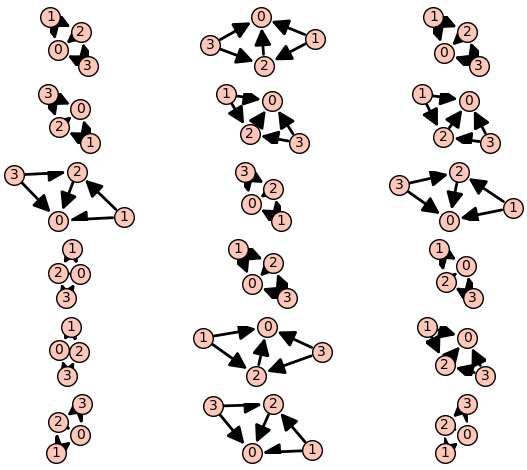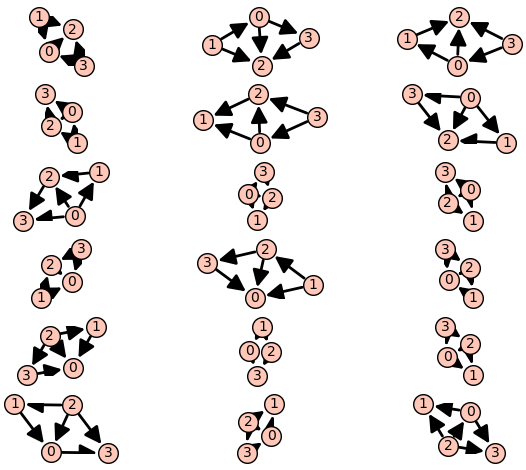Revision history [back]
 | 1 | initial version |
Well... the problem seems to arise from the label=False option. Without it :
sage: [u.edges() for u in g.acyclic_orientations()]
[[(1, 0, 0), (1, 2, 0), (2, 0, 1), (3, 0, 0), (3, 2, 0)],
[(1, 0, 0), (1, 2, 0), (2, 0, 1), (3, 0, 1), (3, 2, 0)],
[(1, 0, 1), (1, 2, 0), (2, 0, 1), (3, 0, 0), (3, 2, 0)],
[(1, 0, 0), (1, 2, 0), (2, 0, 1), (3, 0, 1), (3, 2, 1)],
[(1, 0, 1), (1, 2, 1), (2, 0, 1), (3, 0, 0), (3, 2, 0)],
[(1, 0, 1), (1, 2, 0), (2, 0, 1), (3, 0, 1), (3, 2, 0)],
[(1, 0, 1), (1, 2, 0), (2, 0, 1), (3, 0, 1), (3, 2, 1)],
[(1, 0, 1), (1, 2, 1), (2, 0, 1), (3, 0, 1), (3, 2, 0)],
[(1, 0, 1), (1, 2, 1), (2, 0, 1), (3, 0, 1), (3, 2, 1)],
[(1, 0, 0), (1, 2, 0), (2, 0, 0), (3, 0, 0), (3, 2, 0)],
[(1, 0, 0), (1, 2, 0), (2, 0, 0), (3, 0, 0), (3, 2, 1)],
[(1, 0, 0), (1, 2, 1), (2, 0, 0), (3, 0, 0), (3, 2, 0)],
[(1, 0, 0), (1, 2, 1), (2, 0, 0), (3, 0, 0), (3, 2, 1)],
[(1, 0, 0), (1, 2, 0), (2, 0, 0), (3, 0, 1), (3, 2, 1)],
[(1, 0, 1), (1, 2, 1), (2, 0, 0), (3, 0, 0), (3, 2, 0)],
[(1, 0, 0), (1, 2, 1), (2, 0, 0), (3, 0, 1), (3, 2, 1)],
[(1, 0, 1), (1, 2, 1), (2, 0, 0), (3, 0, 0), (3, 2, 1)],
[(1, 0, 1), (1, 2, 1), (2, 0, 0), (3, 0, 1), (3, 2, 1)]]
The label carries the orientation of an edge. Quick check of the unicity :
sage: len([u.edges() for u in g.acyclic_orientations()])
18
sage: Set(([u.edges() for u in g.acyclic_orientations()])).cardinality()
18
The problem is therefore that print( an edge , label=False) merely suppresses the label. In this special case, it might be pertinent to reverse the order of the edges if the label is 1 ; however, the pertinence of this change in the more general cases of graph printing is to be checked...
HTH,
 | 2 | No.2 Revision |
Well... the problem seems to arise from the label=False option. Without it :
sage: [u.edges() for u in g.acyclic_orientations()]
[[(1, 0, 0), (1, 2, 0), (2, 0, 1), (3, 0, 0), (3, 2, 0)],
[(1, 0, 0), (1, 2, 0), (2, 0, 1), (3, 0, 1), (3, 2, 0)],
[(1, 0, 1), (1, 2, 0), (2, 0, 1), (3, 0, 0), (3, 2, 0)],
[(1, 0, 0), (1, 2, 0), (2, 0, 1), (3, 0, 1), (3, 2, 1)],
[(1, 0, 1), (1, 2, 1), (2, 0, 1), (3, 0, 0), (3, 2, 0)],
[(1, 0, 1), (1, 2, 0), (2, 0, 1), (3, 0, 1), (3, 2, 0)],
[(1, 0, 1), (1, 2, 0), (2, 0, 1), (3, 0, 1), (3, 2, 1)],
[(1, 0, 1), (1, 2, 1), (2, 0, 1), (3, 0, 1), (3, 2, 0)],
[(1, 0, 1), (1, 2, 1), (2, 0, 1), (3, 0, 1), (3, 2, 1)],
[(1, 0, 0), (1, 2, 0), (2, 0, 0), (3, 0, 0), (3, 2, 0)],
[(1, 0, 0), (1, 2, 0), (2, 0, 0), (3, 0, 0), (3, 2, 1)],
[(1, 0, 0), (1, 2, 1), (2, 0, 0), (3, 0, 0), (3, 2, 0)],
[(1, 0, 0), (1, 2, 1), (2, 0, 0), (3, 0, 0), (3, 2, 1)],
[(1, 0, 0), (1, 2, 0), (2, 0, 0), (3, 0, 1), (3, 2, 1)],
[(1, 0, 1), (1, 2, 1), (2, 0, 0), (3, 0, 0), (3, 2, 0)],
[(1, 0, 0), (1, 2, 1), (2, 0, 0), (3, 0, 1), (3, 2, 1)],
[(1, 0, 1), (1, 2, 1), (2, 0, 0), (3, 0, 0), (3, 2, 1)],
[(1, 0, 1), (1, 2, 1), (2, 0, 0), (3, 0, 1), (3, 2, 1)]]
The label carries the orientation of an edge. Quick check of the unicity :
sage: len([u.edges() for u in g.acyclic_orientations()])
18
sage: Set(([u.edges() for u in g.acyclic_orientations()])).cardinality()
18
The problem is therefore that print( an edge , label=False) merely suppresses the label. In this special case, it might be pertinent to reverse the order of the edges if the label is 1 ; however, the pertinence of this change in the more general cases of graph printing is to be checked...
EDIT : The problem may be more extensive that it seems :
sage: graphics_array([plot(u) for u in g.acyclic_orientations()], nrows=6, ncols
....: =3)
Launched png viewer for Graphics Array of size 6 x 3

which is eighteen copies of the same directed graph.
Workaround :
sage: def fix(e):return tuple([e[1], e[0]]) if e[2] else tuple([e[0], e[1]])
sage: graphics_array([plot(DiGraph([fix(u) for u in v.edges()])) for v in g.acyc
....: lic_orientations()], nrows=6, ncols=3)
Launched png viewer for Graphics Array of size 6 x 3

which seems correct.
This is probably worth of a Github ticket (by someone more versed in graph theory and its Sage implementation(s) than I am...).
HTH,
